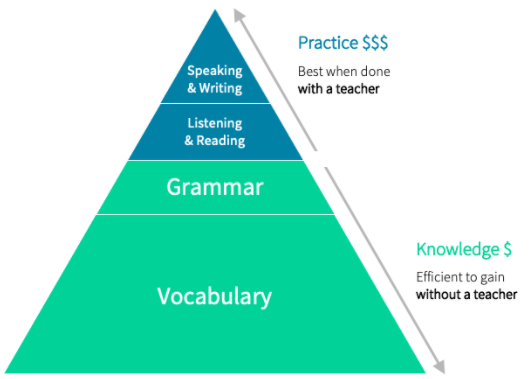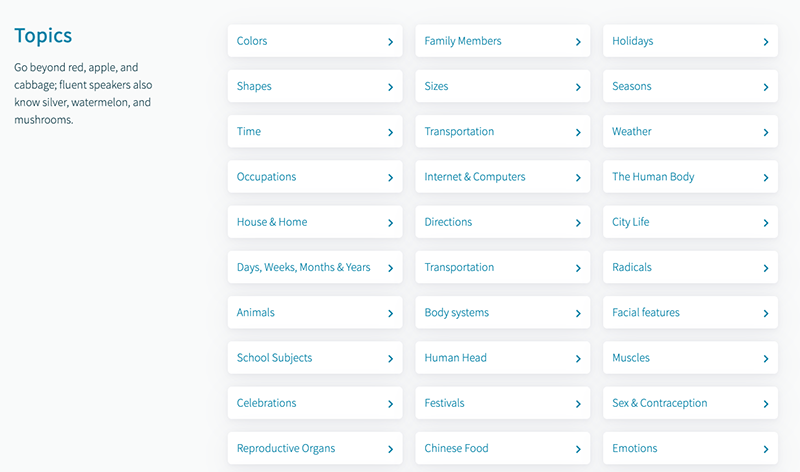| TLDR: Wait until you’re very proficient in Chinese (i.e. passing HSK 5 or 6) before seeking out specialized “business” Mandarin courses. When you start learning Chinese for business, narrow your focus as much as possible. To be efficient with your time and money, spend most of your time studying on your own. |
Whether you’re looking to capitalize on the spending power of the increasingly wealthy Chinese population or you want to produce goods or services in China instead of your home country, learning “business Chinese” can be an attractive idea.
In this article, we’ll describe what it means to study “business Mandarin”, preview the different types of courses that exist (and who should be taking them), and identify the common pitfalls to making progress (and present some solutions).
Should you really be learning business Chinese?
Well, this is awkward. Let’s get it out of the way now. If you’re an adult with an impressive, specialized career, and you’re thinking about ways to advance your earning potential, learning business Chinese might not be the best option for you.
While undoubtedly a valuable skill set, obtaining professional level Mandarin proficiency requires an enormous investment of time (and money). Our article Learning Chinese as an English speaker goes into considerable detail as to why it is so challenging and time consuming.
If you’re starting as a beginner, you should expect to spend at least 2,000 to 4,000 hours studying (learning vocabulary and grammar, practicing reading, writing, listening and speaking, etc.) to level up from absolute beginner through to enough proficiency to be able to conduct business in Chinese.
To leverage a business term, let’s discuss opportunity cost (meaning: what opportunities must you give up by deciding to learn Chinese?)
If you’re a beginner and you want to start learning Chinese for business, it will take you thousands of hours before your investments in “advancing your career with Chinese language ability” will pay off.
Ask yourself: is there anything else you could do with that much time that would advance your career more rapidly (i.e. learn to code, work more hours for a promotion, attend more networking events, make more sales calls, etc.)?
Learning Chinese for business can be a fascinating and satisfying experience, but if you’re doing it only to increase your earning potential, it’s at least worth reviewing your other “investment opportunities” for your time and money. Which investment will earn you the largest ROI?
Consider also that you can still access the Chinese market, even if you don’t learn Chinese.
For example, you could hire a professional translator to accompany you on trips to mainland factories or handle negotiations for you, and it would still be considerably cheaper than investing tens of thousands of dollars (and thousands of hours) in specialized courses and tutoring.
If you’re earlier in your career, or have already started down the path to learning Mandarin, or just want to YOLO your way to greatness, read on!
What exactly is “Business Chinese” anyway?
The term “Business Chinese” is broad to the point of being virtually meaningless without more context.
Do you mean social media marketing Chinese? Interview preparation Chinese? Corporate finance Chinese? Asset management? Purchasing goods from a factory? Negotiation? Retail? Technology? The stock market? International policy?
If you’re learning Chinese for business, each of the above themes is enormous — and spreading your learning efforts broadly over all of them would likely leave you incompetent in all of them.
Narrow your focus
The more you’re able to specialize the canon of material you will be learning about, the more likely you’ll be able to actually use the words, phrases, and cultural knowledge you study. And using what you learn has undeniable compounding effects: the more you can use what you learn, the more excited you’ll be to keep learning.
This narrowing of your focus is an important concept in advanced language learning, and something we’ll refer back to several times in this article.
Stop now and ask yourself: what type of Chinese business language do you need to be proficient with?
Heads up: Specialized Chinese is predominantly a vocabulary problem.
Grammar rules used in “negotiation” Chinese are the same as the grammar rules used in “stock market” Chinese. But the vocabulary is very different. Specializing your language essentially means growing your vocabulary in one particular area.
Common Mistakes when Learning Chinese for Business
- Specializing too early
- Not specializing enough
- Neglecting self-study
Mistake #1: Specializing too early
If your Chinese isn’t proficient enough to give your Chinese business partners confidence that you’ll be able to handle more advanced “business” conversations, you won’t ever have a chance to use the business Chinese you learn.
Until you reach a reasonably proficient level with your Chinese (HSK 4 at the absolute minimum, HSK 5 even better), you should stick with courses designed for regular, conversational Chinese learning. Think college courses, textbooks, learning apps, etc.
It’s tempting to sign up for a sexy-sounding “business Chinese” course before you’re proficient with normal Chinese, but there are several disadvantages to doing so:
- You’ll be learning Chinese you won’t have an opportunity to use outside of the classroom. Unless you can proficiently handle yourself in regular conversations (enough so that others perceive you as capable enough to speak in non-elementary language), you won’t have a chance to use any specialized language.For example, if you are an asset manager, you might be tempted to sign up for a course that will teach you vocabulary like “portfolio diversification” and “exchange traded funds” and “stock market”.
But let’s be realistic. If your Chinese isn’t at an extremely high level already, in what scenario would you find yourself with an opportunity to use these terms?
- You’ll be paying a lot more. Chinese teachers who focus on teaching “business Chinese” know that their customers have the ability to pay more than the average university student studying for the HSK. (Oftentimes, it isn’t even the business learners themselves paying, but their companies.)
For the right professionals, highly specialized help from Chinese teachers with specific experience in the industry you’re working in are absolutely worth the extra cost. But if you’re a beginner, you can learn basic Chinese language skills elsewhere for a lot cheaper.
Mistake #2: Not specializing enough
When you’re ready to specialize your Chinese language skills, your main task will be narrowing your focus to most accurately reflect the type of vocabulary you’ll actually have a chance to use. Stay too broad, and you may not know enough of your target vocabulary to actually stay in a conversation.
For example, if you’re looking to work in the retail industry, some general terms related to ‘retail’ will of course be useful, but being more focused will give you a more comfortable space to grow from. For example, here are some vocabulary focuses you may choose:
| Too Broad | Better | Best |
| Retail | Clothing | Men’s Clothing |
| Technology | Software Sales | Cloud software sales |
| Finance | Equities | IPOs |
Once you’ve narrowed your focus as much as possible, you can then find tutors that specialize in this area, find reading material (or television shows) that can expose you to this language, and study terms that are most appropriate for you.
Mistake #3: Undervaluing self-study
As we mentioned above, Chinese grammar patterns don’t change as you move from industry to industry. But the vocabulary does change.
Which means specializing in some flavor of business Chinese predominantly means learning new vocabulary. And while you could hire a tutor to help you learn vocabulary, you are perfectly capable of doing so on your own.
Resources for learning Business Chinese
Most learning resources for “business Chinese” are very broad in scope, as they are trying to appeal to the widest possible array of customers. These aren’t bad resources, but broad ones.
So where should you start when learning Chinese for business?
If you’re a beginner, just learn “normal” Chinese
If you aren’t proficient enough with a language to get past the initial conversations with ease, you won’t have a chance to utilize your specialized “business” Chinese.
So if you haven’t yet passed HSK 5, you can feel confident that studying towards the regular HSK curriculum first is a wise approach.
If you’re a complete beginner, be sure to read how to start learning Chinese.
Here are some resources we recommend for beginners:
High-quality textbooks. Here are some textbook series that we recommend:
- HSK Standard Course
- Integrated Chinese
- New Practical Chinese Reader
- Boya
- Developing Chinese
Learning apps. Digital learning apps that target reading, writing, and listening are a great way to get started. We recommend the following:
- Domino Chinese
- HelloChinese
- Duolingo
Start building your vocabulary with Hack Chinese. Vocabulary growth is one of the largest components to language learning. The earlier you start and the more efficient you are, the better off you’ll be.
Hack Chinese lets you follow along your coursework from textbooks or learning apps, as well as make your own lists when you’re ready to specialize.
Use a tutor. While apps can help tremendously with acquiring knowledge and practicing reading/listening, you should not rely on them for speaking practice. It’s easy to find a tutor online, just google “online Mandarin tutor”. We recommend tutors from LTL School.
If you’re advanced and ready to specialize, focus on vocabulary, exposure, and role-playing
- Grow your Chinese vocabulary
- Increase your exposure
- Role-play
Build your vocabulary
Specialized Chinese (business or otherwise) is predominantly a matter of expanding your vocabulary within a certain canon, and then being efficient with how you learn.
Hack Chinese is a specialized tool for growing your Mandarin vocabulary. It lets you choose from a range of predefined vocabulary lists, or create your own using the integrated dictionary.
You can choose from a set of predefined lists to start your specialization:
Or make your own lists and track metrics:
Using Hack Chinese to manage your vocabulary growth will save you time by keeping you efficient.
Increase your exposure
Becoming proficient with specialized Mandarin is no different than becoming proficient with everyday Mandarin. You need a lot of exposure.
So find news articles, video clips, TV shows, and books in your target domain, and increase your exposure as much as possible. If you’ve narrowed your focus enough, you can be confident that any words you encounter are relevant to your field, so you can add them to your lists on Hack Chinese. Keep reading, keep listening, and over time you’ll truly master what you’re learning.
Role-play with a tutor
At some point, you will need to practice speaking with the new words.
Armed with your specific focus and a list of vocabulary words, seek out a teacher who can help you practice precisely within this canon.
When you’re in class, make sure you spend as much time as possible using the words yourself. If your tutor spends most of the class speaking, move on to another tutor who can get you speaking with the new words.
The easiest way to do this is by role playing. While this can feel silly at first, pretending you are in various situations and need to respond (with the target vocabulary) is a way to practice the ‘spontaneous language creation’ that you need.
In Conclusion
Learning Chinese is a big task, and learning Chinese for business won’t be particularly useful until you’re already very proficient with the language.
Specialization of your Chinese language abilities is almost solely about the vocabulary you know. Grammar patterns don’t change when you switch industries, but the terminology does.
When you are ready, narrow your focus as much as possible. Then, build your vocabulary, increase your exposure to it, and role-play with a tutor.







